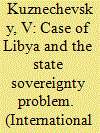|
|
|
Sort Order |
|
|
|
Items / Page
|
|
|
|
|
|
|
| Srl | Item |
| 1 |
ID:
107098


|
|
|
|
|
| Publication |
2011.
|
| Summary/Abstract |
CONCERNED WITH THE FLARE-UPS of popular revolutions in North Africa and the Middle East in March and April and the events in the Libyan Arab Jamahiriya, in the first place, the world community turned its gaze at the United Nations and its role in conflict settlement. The public and the UNSC tried to outline the limits beyond which no international interference in domestic policies was acceptable. In short, the world community wanted to know how state sovereignties could be preserved in the contemporary world; in fact, the future of the Westphalian principles is at stake. The Libyan crisis was unfolding to the accompaniment of the media deliberations, in Russia and the West, that the Westphalian principles should be abandoned. Nikolai Zlobin, a Russian migr living in the United States, Director of Russian and Asian Programs at the Washington-based World Security Institute, published in Rossiiskaia gazeta, the newspaper of the RF government, a long article called "Konets suverenitetov" (The End of Sovereignties). He has come close to admitting that the international law based on the Westphalian principles is a thing of the past. "The tragedy in Japan or, for example, in Libya has shown that the national sovereignty cannot be protected any longer," he writes. In the 21st century, he goes on to say, "the priority of national sovereignty per se vs. the world community's basic interests can no longer be preserved; the same applies to the principle of non-interference in domestic affairs and inadmissibility of ensuring safety of a country, region or people by external forces; otherwise the world community will have to pay dearly. At least this is how I see it from Washington.
|
|
|
|
|
|
|
|
|
|
|
|
|
|
|
|
| 2 |
ID:
153455


|
|
|
|
|
| Summary/Abstract |
Over the past 25 years, that is, since a new sovereign state entity appeared in the world arena in December 1991, this is the fifth document adopted by Russia's supreme leadership that presents its views on the fundamental principles, priorities, tasks, and goals of Russia's foreign policy. However, if this event is approached from a practical (businesslike), not formal, standpoint, then it turns out that it is in fact the first document on this scale and of this kind, as it drastically differs from the previous documents. When a new international entity emerged in the geographical territory of the RSFSR (Russia's historical territory) on June 12, 1990, the leadership of this entity, as represented by Boris Yeltsin and his entourage, had no idea of what economic and political model they would propose to 145 million RSFSR citizens. The only thing that was somehow clear was that this model would not be a repetition of the Bolshevist state planning model. A foreign policy concept was not formulated. So, the first decade was spent in search of a concept. It was almost a blind search.
|
|
|
|
|
|
|
|
|
|
|
|
|
|
|
|
| 3 |
ID:
117381


|
|
|
|
|
| Publication |
2012.
|
| Summary/Abstract |
EARLY IN JUNE 2012, President of the Russian Federation Vladimir Putin arrived to the People's Republic of China with a state visit; it was at the same time that the SCO Heads of Governments Council met in Beijing.
The Moscow press reacted with "Disagreements between the RF and China Resurfaced at the Summit," "The Shanghai Organization Is Torn Apart by Organizers," "The Shanghai Organization of Competition," "The Beijing Summit: An Arena of Latent Moscow-Beijing Rivalry" and much more in the same vein. It was stressed that the Beijing SCO Summit had failed "to agree on the SCO long-term plans and sign the SCO Development Strategy" and had "merely" agreed to sign "The Strategic Plan for the Medium-Term Development of the Shanghai Cooperation Organization"; 20-odd documents signed by Moscow and Beijing during President Putin's state visit were pushed aside and forgotten.
|
|
|
|
|
|
|
|
|
|
|
|
|
|
|
|
| 4 |
ID:
078907


|
|
|
| 5 |
ID:
189781


|
|
|
|
|
| Summary/Abstract |
O Ancient World, before your culture dies, Whilst failing life within you breathes and sinks, Pause and be wise, as Oedipus was wise, And solve the age-old riddle of the Sphinx. That Sphinx is Russia. Grieving and exulting, And weeping black and bloody tears enough, She stares at you, adoring and insulting, With love that turns to hate, and hate - to love.
|
|
|
|
|
|
|
|
|
|
|
|
|
|
|
|
|
|
|
|
|